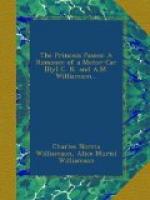We had decided last night that it would not be wise to attempt the journey by way of the Dent du Nivolets, as it was on a higher level than the summit of Mont Revard, and we should risk being again extinguished under a nightcap of snow. We descended, therefore, by the simpler and shorter route, but it was full of interest for the strangeness of the landscape, and the buildings which we reached on lower planes.
The houses were no longer characteristically French, but a bastard Swiss. The heavy, overhanging roofs were thatched, and of enormous thickness; the walls of grey stone, with roughly carved, skeleton balconies. The peasants no longer smiled at us in good-natured curiosity, but regarded us dourly, though they were gravely civil if we had questions to ask.
Although I gave Joseph no instructions, and he made no suggestions, by common consent we hastened on as if a prize were to be bestowed for our good speed, at the end of the journey. On other days we had sauntered, allowing the animals to snatch delicious hors d’oeuvres from the bushes as they passed, but to-day Finois was in the depths of gloom. There was no grey Souris, no spectacled Fanny-anny to cheer him on the way, and if he reached out a wistful mouth towards a branch, he was hurried past it. How would we feel, I asked myself, if, with the inner man clamouring, we were driven remorselessly along a road decked on either side with exquisitely appointed tables, set out with all our favourite dishes, to be had for nothing—never once allowed to stop for a crumb of pate de foie gras, or a bit of chicken in aspic? Yet asking myself this, I had no mercy on Finois.
We stopped for lunch at a queer auberge, in an abortive village appropriately named Les Deserts, where the highroad for Chambery began. An outer room roughly flagged with stone, was kitchen, nursery, and family living-room in one. It swarmed with children, and was presided over by two of Macbeth’s witches, who were not separated from their cauldrons. I took them to be rival mothers-in-law, and they could have taught Innocentina some choice new expressions valuable to test upon donkeys or other heretics; but they sent me a steaming bowl of excellent coffee, when I half expected poison; fried me a couple of eggs with crisp brown lace round the edges, and took for my benefit, from one of the shelves that lined the nursery wall, the newest of a hundred loaves of hard black bread.
I ventured to ask a down-trodden daughter-in-law of the Ladies of the Cauldrons, whether a very young gentleman, and an older but still all-young woman, with two donkeys, had stopped at the auberge some hours earlier.
The spiritless one shook her head. But no. The only other customers of the house thus far had been the postman and two soldiers. The party might have passed. She and her parents were too busy to take note of what went on outside. A faint chill of desolation touched me. It would have been cheering to have news of the Boy and his cavalcade en route.




